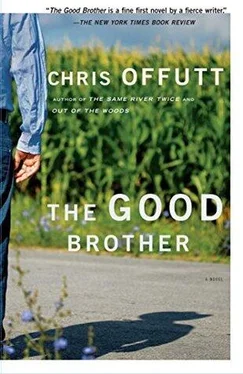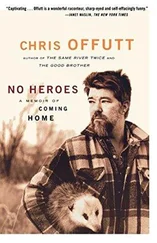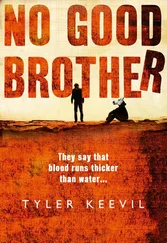Main Street held a few businesses that were competing with a new mall. In a secondhand store he bought a typewriter. Several black people were in the store and he tried not to stare, never having seen any before. He wanted to move near for a better look, but was afraid to, and didn’t know why. They ignored him and he wondered if it was deliberate. He decided not, since they probably saw plenty of white people.
He received directions to the Bureau of Records and walked up its granite steps, wondering how many men were employed merely to clear them of snow in winter. Beyond glass doors a sign warned of video surveillance. He turned around and went down the steps to his car.
He drove east, working on the problem in his head. He couldn’t get a post office box in another name without identification, but he couldn’t get the identification without a post office box. It reminded him of looking for work as a kid. He was caught in a similar crossfire between experience and a job, unable to get one without the other. The solution then had been to lie, telling the boss that he’d painted houses with his uncle the year before. Virgil was hired, and spent the first month hoping nobody noticed that he barely knew which end of the brush to hold.
An abrupt thought caused him to swerve into the breakdown lane. He steered back to the road. In Lexington he bought a city map and studied it in a diner. The waitress gave him directions to the police station. New Circle Road wrapped the city like a lasso and he missed his exit and became lost in a maze of streets. Two hours later, he arrived at police headquarters, a mile from the diner.
He sat in the car for a long time, working out all the details in his head. Horns honked around him. Automobile exhaust mixed with the heat and the general smell of a city — many humans compressed into a small space. There were no trees on the street. He tucked his wallet in the glovebox and left the car. It was the first time he’d locked a vehicle in his life.
The air inside the police station smelled of sweat and cigarette smoke, cut with industrial cleaning fluid. There was a gauntlet of two benches filled with a variety of people. At the end of the tiled lane was a window behind which sat an old man in uniform. Virgil approached slowly. He was sweating.
The old cop looked at him. Unsure of procedure, Virgil stayed quiet.
“What?” the cop said.
“My wallet,” Virgil said.
“Your wallet.”
“It was stolen.”
The cop shuffled through papers for the correct form.
“Okay. Stolen wallet. Name?”
“What?”
“Name. What’s your name?”
“joe Tiller,” Virgil whispered.
“What?”
“Joe Tiller.”
“Address?”
“Five-twenty South Avenue.”
“Go on.”
“What?” Virgil said.
“What town?”
“Here.”
“Phone?”
“No phone.”
“Description of the wallet.”
“Brown.”
“Tri-fold or bi-fold.”
“Regular, you know.”
“Okay, bi-fold. Contents?”
“Forty dollars. Some pictures. All my ID.”
“Type of ID?”
“Driver’s license, birth certificate, Social Security card.”
“Okay. If we hear anything, we’ll mail you a card.”
“What about until then?”
“Search the area where it was stolen. Look in garbage cans and dumpsters. They usually get rid of it fast and keep the money.”
“No, I mean, for ID.”
“That’s not a police matter.”
“What do I do?”
“You’ll have to apply for new,”
“Can you give me something that says my wallet was stolen?”
“I can give you a copy of this form. It’ll be a few minutes. Take a seat.”
Virgil found a place on the bench. It was nicked and greasy, carved by pocketknives. Two children sat on the dirty floor in front of their mother. She was wearing large sunglasses, and beneath them Virgil could see the swellings on her face. She kept one arm stiff to her body. People dozed against the wall. Others stared at the floor or at the space in front of them.
Boyd had always said that the best lie was to tell the truth in a way that made the listener believe it was false. Next was to keep your lies very close to reality. Virgil was veering far from either course and it worried him. He’d never been in a police station and thought it would be nicer. He expected a squad of policemen to arrest him at any moment. They knew he was lying. They’d searched his car and found his wallet. He became aware of a yelling voice, and people were looking his way. The old cop was staring at him. He stood in a panic, ready to ran.
“Mr, Tiller,” the old cop called. “Mr. Tiller.”
Virgil crossed the room and the cop handed him a photocopy of the police report. Outside he leaned against a light pole and forced himself to breathe slowly. Lying was easy. Finding his car took half an hour. In the woods he could locate a tree he’d touched years ago, but in Lexington he was immediately lost. He’d seen deer stumble across a road at night, stunned by car headlights, and he felt the same sense of bewilderment.
He was hungry, but he had one more stop. He climbed another set of steps and waited in line at the post office. The male clerks wore ties, and he chuckled at the thought of Zephaniah in one. He prepared in his mind what he was going to say.
“I’m sorry,” the man behind the counter said. “You must have two forms of ID to rent a box.”
“My wallet got stolen,” Virgil said. “I have a check from my old job coming, and I got to have somewhere for them to send it.”
“Use a friend’s address.”
“Don’t know nobody.”
“How about where you’re staying, then.”
“Ain’t got a place yet. That’s just it. I can’t get one until I get the check, and I can’t get the check until I get a mailing address.”
“Well, buddy, you’re in a hole of water got no deep to it.” He lowered his voice. Virgil recognized an accent from the eastern end of the state. “Was me, I’d go to one of them mail services.”
“Mail service?”
“Yeah, they got them now. It’s like a post office but it’s private.”
Virgil found a listing in the phone book and drove to the storefront business. He told the clerk about the check from his last job and offered six months’ advance rent on a mailbox. The man gave him a set of keys, thin metal slivers that would open his future.
“Thank you, Mr. Tiller,” he said as Virgil left.
He drove home along the interstate, remembering its construction when he was a child. It had employed many men, but when the site surpassed a commuting distance of three hours, men who’d worked a decade were suddenly jobless. Their children were half-raised, their homes partially paid off. The federal government had followed the mineral companies in creating a boom-or-bust economy with a disposable workforce.
The road east went through the lovely rolling land of Lexington’s horse farms. Wind rippled the bluegrass as if it were the sea. There was a villa that resembled something from Mexico, and farther along, an actual stone castle. The land began its hilly ascent in Montgomery County, where the Pottsdale Escarpment jutted from the earth, marking the geological boundary of the Appalachians. Beyond that lay the disorganized terrain that was Virgil’s country.
Night had come to the hills by the time he reached Rocksalt. Its few traffic lights blinked yellow. There would never be a New Circle Road here because the hills pressed too close, leaving room for only three streets that crossed town. The night air was sweet and rich. Stars spread like dust above the treeline. He drove up the dirt road of his home hill.
Virgil wrote a letter requesting a copy of the birth certificate for Joe Tiller, He typed it, using the mailbox in Lexington as a return address. If he dropped it into a public mailbox in town, it would get trucked to Lexington and postmarked there. When he finished, he burned the handwritten original outside. A glowing wafer of ash wafted into the night sky.
Читать дальше












